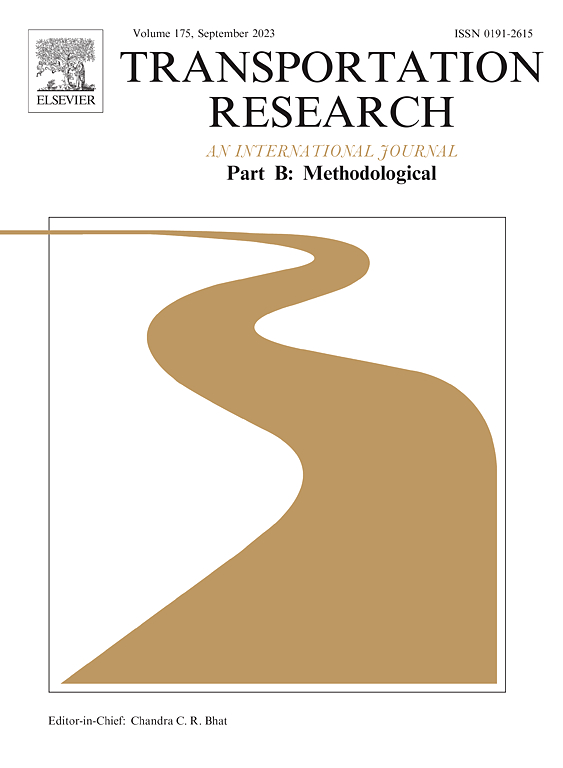轻资产、中资产或重资产业态下城市众包平台的优化运营策略
IF 5.8
1区 工程技术
Q1 ECONOMICS
引用次数: 0
摘要
本文研究了城市众包平台的运营策略,该平台利用交通系统中出行 "人群 "的潜在能力来促进包裹递送。我们建立了一个分析模型,以描述不同业态(轻资产/中资产/重资产)的众包运输运营商的决策和运营策略。轻资产平台将客户与人群中的潜在承运人联系起来,不涉及配送资产,而中资产和重资产运营商则分别将人群承运人与外包或自有配送车队整合起来。具体而言,我们首先根据客户的使用意愿和人群的服务意愿,提出了众包系统的双面市场均衡。在市场均衡的基础上,我们确定了众包运营商在定价和/或车队规模方面的最优策略,以实现不同业态下的利润最大化或社会福利最大化。我们的研究表明,引入众包服务可以同时提高物流客户、人群和众包平台运营商的利益,从而实现三赢。此外,我们还建立了一种业态优于另一种业态的分析条件。我们发现,如果某一业态中未匹配订单的外部性(或边际社会成本)较小,就会为客户带来更大的消费者剩余,为人群承运商带来更大的净收益,为众包运输运营商带来更多利润。在温和条件下,采用轻资产或中资产业态的众包运营商可以在社会最优状态下获得正利润。本文章由计算机程序翻译,如有差异,请以英文原文为准。
Optimal operation strategies of an urban crowdshipping platform in asset-light, asset-medium, or asset-heavy business format
This paper investigates the operation strategies of an urban crowdshipping platform, which utilizes the latent capacity of the traveling ‘crowd’ in the transportation system to facilitate parcel delivery. We develop an analytical model to characterize the decision-making and operation strategies of a crowdshipping operator in alternative business formats (asset-light/medium/heavy). Asset-light platforms connect customers with potential carriers in the crowd without involving delivery assets, whereas asset-medium and asset-heavy operators integrate crowd carriers with outsourced or owned delivery fleets, respectively. In particular, we firstly formulate the two-sided market equilibrium of crowdshipping system on account of customers’ willingness to use and crowds’ willingness to serve. Based on the market equilibrium, the crowdshipping operator’s optimal strategies in terms of pricing and/or fleet sizing are identified for profit-maximization or social welfare-maximization in alternative business formats. We show that the introduction of crowdshipping can simultaneously improve the benefits of logistics customers, the crowd, and the crowdshipping platform operator, leading to a win-win-win outcome. Furthermore, we establish analytical conditions for one business format being superior to another. We find that if the externality (or marginal social cost) of an unmatched order is smaller in a particular business format, it will result in larger consumer surplus for customers, greater net benefit for crowd carriers, and more profit for crowdshipping operator. Under mild conditions, the crowdshipping operator adopting the asset-light or asset-medium format can earn a positive profit at the social optimum.
求助全文
通过发布文献求助,成功后即可免费获取论文全文。
去求助
来源期刊
CiteScore
12.40
自引率
8.80%
发文量
143
审稿时长
14.1 weeks
期刊介绍:
Transportation Research: Part B publishes papers on all methodological aspects of the subject, particularly those that require mathematical analysis. The general theme of the journal is the development and solution of problems that are adequately motivated to deal with important aspects of the design and/or analysis of transportation systems. Areas covered include: traffic flow; design and analysis of transportation networks; control and scheduling; optimization; queuing theory; logistics; supply chains; development and application of statistical, econometric and mathematical models to address transportation problems; cost models; pricing and/or investment; traveler or shipper behavior; cost-benefit methodologies.

 求助内容:
求助内容: 应助结果提醒方式:
应助结果提醒方式:


